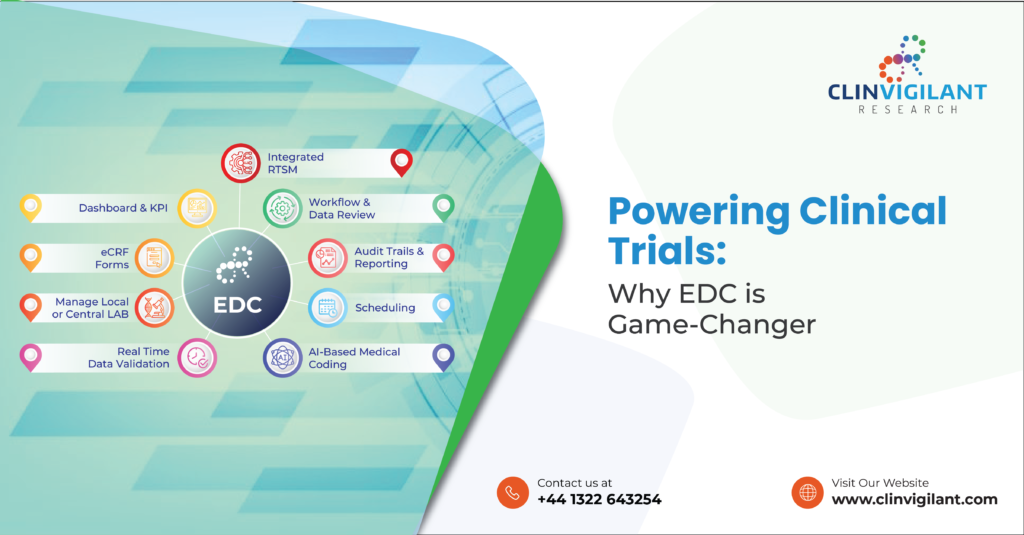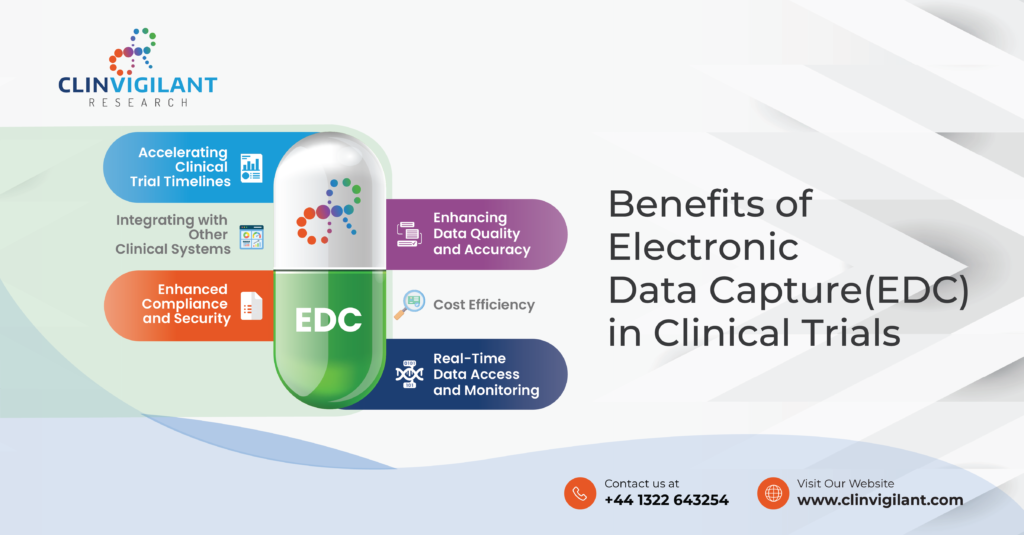
Clinical research has undergone tremendous modifications in past years because of technology. One of the significant forces changing the nature of clinical research is the Electronic Data Capture system (EDC). The growing demand for faster, more efficient, and higher-quality data makes the use of EDC in Clinical Trials the new game-changer toward streamlined data management, compliance, and outcomes. This article explores how EDC in clinical research revolutionizes clinical trial dynamics, unlocking efficiency, accuracy, and speed.
The Rise of EDC in Clinical Trials
In the past, the data collection was done using the paper-based process in clinical trials which witnessed numerous mistakes and slow analysis time. However, the evolution of Electronic Data Capture in Clinical Trials has completely transformed how data is handled and managed. With EDC, it becomes possible to collect data electronically using a secure digital interface that helps to improve data accuracy significantly, reduce costs, and make trial data accessible in real-time. Research shows that EDC has gained ground in more than 94 percent of clinical trials and, as such, holds a strategic role in the sector.
Why EDC is a Game-Changer
EDC technology has redefined how clinical trials are conducted, earning its place as a game-changer by enhancing data management, compliance, and efficiency. Here’s a closer look at the specific benefits that make Electronic Data Capture in Clinical Trials essential:

1. Enhancing Data Quality and Accuracy
One of the benefits of EDC in clinical research is that it reduces errors in data entry. Paper forms are liable to misinterpretation and transcription errors, but EDC systems usually offer built-in validation checks that prevent these errors from happening at the time of entry.
All such checks ensure only true data is captured since maintaining the quality and integrity of trial results requires having such checks in place. Automated data checking, remote monitoring, or electronic case report forms- through all these ways EDC upgrades data quality by enforcing instant validation and reducing post-capture data cleaning.
2. Real-Time Data Access and Monitoring
With an EDC system, research and sponsors get access to the data collected during trials in real-time. Such access has the advantage of helping individuals identify trends, anomalies, and adverse events within shorter periods. The use of real-time access is extremely relevant in decentralized clinical trials, where remote data collection has become more prevalent than ever.
Real-time monitoring will allow the clinical trial manager to make more informed decisions at the point of need on time and prevent adverse events from developing into unfavourable trends. In this age of rapid decision-making, easy on-demand access to data leads to trials being completed.
3. Accelerating Clinical Trial Timelines
Data collection and processing in clinical trials have always been time-consuming. Electronic Data Capture in Clinical Trials makes these processes faster by reducing the time it takes to enter and verify data. This implies that the time taken to lock a database point at which data collection is completed is shorter with EDC systems. Indeed, reportedly some studies have shown that EDC cuts this cycle by around 50-80%; the trials are faster to analysis and conclusion; thus, reducing the time to the market for life-saving therapies.
4. Cost Efficiency
Another important advantage of EDC in clinical trials is cost savings. Data entry, storage, and transportation in paper-based trials are expensive undertakings. EDC significantly cuts down on all these costs because it digitally collects and stores data and consequently reduces the use of physical resources.
In addition, error rates are lower; correspondingly, less time will be spent correcting data, cutting down on the total financial cost of clinical trials since efficiency and faster trial completion also lower the overall cost. Another estimate suggests that EDC can reduce data management by up to 30%; this is a great save for sponsors and research houses.
5. Enhanced Compliance and Security
Regulatory compliance, especially regarding data privacy and security in clinical research is highly of great importance. EDC systems follow worldwide standards of the FDA 21 CFR Part 11 and also GDPR rules set for protecting electronic records and protecting patient information.
EDC solutions have the potential to secure more access through multiple factors like authentication as well as audit trails to ensure good data integrity and the least chance for unauthorized access. This is very important for regulatory compliance but also helps in keeping patient trust and keeping the data confidential.
6. Integrating with Other Clinical Systems
Other systems that EDC can be integrated with includes CTMS, eConsent platforms, and ePROs. This helps unify the data from a clinical trial into one platform; thus, having a central source of truth with which stakeholders can better collaborate. This interoperability ensures data coming from other sources harmonize to make it smooth for transfer with no risk of discrepancies.
Challenges and Limitations of EDC
While EDC provides many benefits to clinical trials, the implementation of it is not without its share of problems. Some of the most significant limitations that organizations face when adopting an EDC system are as follows:
- High Implementation Costs: An Electronic Data Capture in clinical trials is expensive to set up, and the costs include the purchase of the software, setup, and training. For smaller research organizations, these costs are a real barrier.
- Complex System Requirements: Typically, EDC systems are required to have technical knowledge at the time of installing the equipment and using it. Technicalities of customizing, and database configuration add more time and resource requirements.
- High-Learning Curve: Changing from old-fashioned paper-based methods to an EDC platform requires comprehensive training in the workforce. Entry of data will be slower during the transition period due to getting all users familiar with the system.
- Challenges of Integrating with Legacy Systems: Introducing EDC seamlessly in collaboration with legacy tools such as CTMS or electronic health records might be tricky in highly regulated trials, in which data accuracy and flow would form the cornerstone of trials.
- Scalability Issues with Small Trials: Even though cloud-based EDC solutions are more scalable, small trials may still not have the flexibility and resource allocation to be as efficient as needed in such scenarios.
Future of EDC in Clinical Trials
Clinical research is continually evolving, and so is the technology utilized to handle it. There are so many prospects for EDC in clinical research owing to its advancements, which aim to improve data quality and processing speeds further through AI. For instance, insight from AI can predict patient responses and assist with protocol adjustments and indeed real-time monitoring. This move towards decentralized trials will further push the EDC solution to become more integrated with remote collection tools, like wearable devices and mobile apps, to make it easier for patients to participate from home.
Another emerging trend is that of real-world evidence getting merged into EDC data. As clinical trial data are brought together with real-world data, such as electronic health records and claims data, researchers can better understand the outcomes for patients and make a more informed decision about what works and what does not.
As for the field where accuracy, compliance, and efficiency come first, Electronic Data Capture in Clinical Trials is very powerful in addressing these comprehensively. The role that EDC systems play is simply to accelerate clinical trials as they continue to deliver high-quality data. Challenges do abound; however, the benefits of taking EDC far outweigh the cost, making it an important asset in modern clinical research. This technology will further speed up clinical trials by bringing them faster, more accurate, and cheaper. Patients will thus be accessed sooner through new treatments.
Experience the power of ClinVigilant’s EDC in Clinical Trials. Schedule your personalized Demo today and see how our solutions can transform your research!

